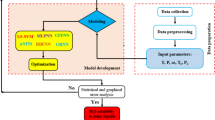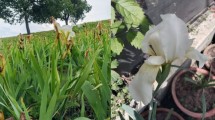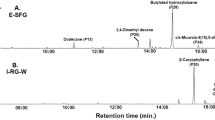Abstract
SHIKIMIC, quinic, succinic, malic, citric, fumaric and lactic acids have been separated on ‘Dowex ]’ ion-exchanger from combined aqueous and alcohol extracts of Iris pseudacorus, using the method of Hulme and Wooltorton1. These acids have been identified from their elution positions, their RF values in various solvents and by chemical tests where appropriate.
This is a preview of subscription content, access via your institution
Access options
Subscribe to this journal
Receive 51 print issues and online access
$199.00 per year
only $3.90 per issue
Buy this article
- Purchase on SpringerLink
- Instant access to the full article PDF.
USD 39.95
Prices may be subject to local taxes which are calculated during checkout
Similar content being viewed by others
References
Hulme, A. C., and Wooltorton, L. S. C., J. Sci. Food Agric., 9, 150 (1958).
Hattori, S., Yoshida, S., and Hasegawa, M., Physiol. Plant., 7, 283 (1954).
Weiss, U., Davis, B. D., and Mingioli, E. S., J. Amer. Chem. Soc., 75, 5572 (1953).
Weinstein, L. H., Porter, C. A., and Laurencot, jun., H. J., Contrib. Boyce Thompson Inst., 21, 201 (1961).
Author information
Authors and Affiliations
Rights and permissions
About this article
Cite this article
HENSHAW, G., COULT, D. & BOULTER, D. Organic Acids of the Rhizome of Iris pseudacorus L.. Nature 194, 579–580 (1962). https://doi.org/10.1038/194579b0
Issue date:
DOI: https://doi.org/10.1038/194579b0
This article is cited by
-
Shikimic acid: review of its analytical, isolation, and purification techniques from plant and microbial sources
Journal of Chemical Biology (2012)



